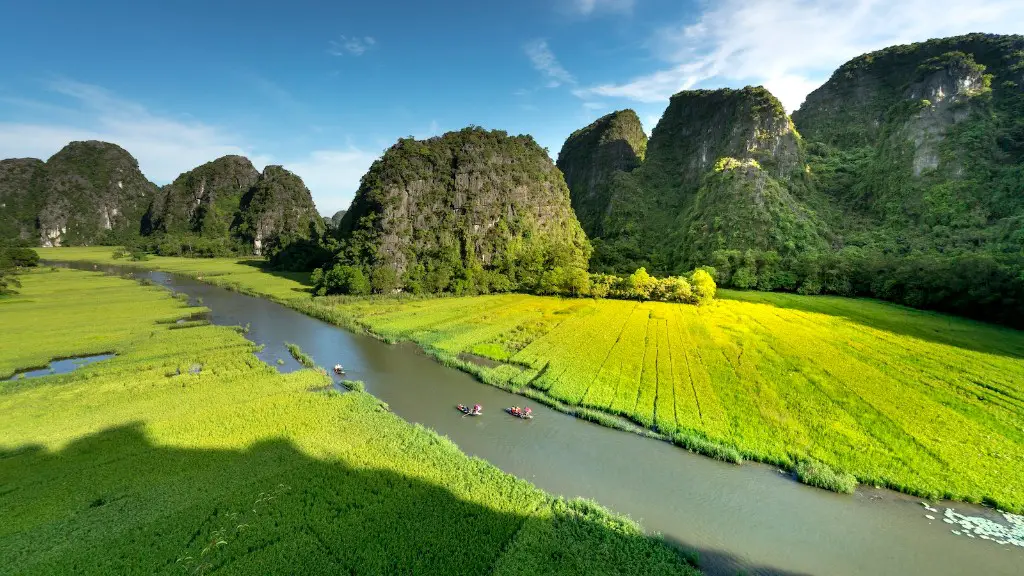The Nile River is a major resource to ancient Egypt due to its size, length, volume and power. The Nile River is a natural resource that is used by millions of people living near it and its importance in the development of ancient Egypt cannot be understated. The Nile River is the longest river in the world, stretching 4,258 miles from central Africa to the Mediterranean Sea. Its source comes from two of the most powerful rivers in the region, the White Nile and the Blue Nile. It is estimated that approximately 65.9 million people rely on the Nile River for their daily water needs and it supports a highly productive agricultural system. The Nile River enabled the ancient Egyptians to grow food, build cities and feed their large population. It also helped them make a living by transporting goods, providing fishing and other activities associated with the river.
The ancient Egyptians incorporated the Nile River into their beliefs and religious practices. They viewed it as the source of life and believed that the river had divine origins. They created elaborate rituals and festivals to honor the river. The most famous of these was the Festival of The Inundation, which was a yearly celebration of the flooding of the Nile River that was essential for their agricultural success. The Egyptians also worshipped the Nile River as the god Hapi. The god Hapi was associated with abundance and fertility, which was connected to their view of the Nile River as the source of life.
One of the most important benefits of the Nile River is its water availability. Its rising and falling water levels allowed the ancient Egyptians to farm land that was close to the river. Flooding of the Nile allowed the Egyptians to produce much needed food supplies, which was symbolic of a temporary new life for the country. The regular floods of the Nile each year would bring fresh silt, which helped build up the soil, making it suitable for farming. The Nile also provided them with a method of transportation to move goods from city to city. Boats were the primary way in which goods were carried up and down the river.
The Nile River was also a source of freshwater for the ancient Egyptians. They built reservoirs to collect freshwater for drinking and for irrigating the fields. As water was plentiful in the river, the ancient Egyptians were able to maintain gardens and create intricate irrigation systems to transport water to other parts of the country. This allowed them to survive the droughts that would occur every year. Additionally, they built dams to control flooding on the river.
The Nile River was also an essential part of the ancient Egyptians’ religion and culture. They believed that the god Hapi was the source of fertility and abundance. As mentioned before, they honored the Nile through elaborate ceremonies and festivals. They associated the Nile with the gods of their religion and created stories around it. The river also provided the basis for their writing systems and daily life practices.
In conclusion, the Nile River is a major resource to ancient Egypt due to its size, length, volume and power. It provided the Egyptians with a reliable source of fresh water for drinking, irrigation and farming. It also served as a means of transportation for goods and helped to support a thriving economy. The river was also an important part of the ancient Egyptians’ religion and culture, providing the basis for their writing systems and daily life practices. All of these benefits made the Nile River one of the most important resources to the ancient Egyptians.
Economic Benefits of the Nile
The economic benefits of the Nile to Ancient Egypt cannot be understated. The river supported a very productive agricultural system, providing food and supplies to the Egyptians. Its floods allowed the Egyptians to produce much-needed crops such as wheat, barley, flax, lentils, and peas. Additionally, farmers used the flooding of the river to increase yields and enrich their land with fresh silt.
The Nile also provided a significant amount of trade for the Egyptians. Along its course, it carried goods such as wine from Canaan, linen from Sinai, and olive oil from Syria. This allowed the Egyptians to increase their wealth and international relations, which in turn helped them to expand their empire. Additionally, the Nile allowed the Egyptians to build boats, aiding in commerce and fishing. Fishing was a major source of food and income in Ancient Egypt.
The river also had strategic advantages for the Egyptians. Many of their settlements and key cities, such as Memphis and Thebes, were located on the banks of the Nile. This gave attackers a difficult time trying to capture these areas due to the protection of the river. In addition, the river also served as a natural border, creating a natural defense system for the country.
Finally, the Nile also provided the Egyptians with strong cultural identity. They took great pride in the river and its contributions to their society. It created stories and poetry for the Ancient Egyptians, along with other forms of art. The river was an integral part of the way the Ancient Egyptians viewed the world and their place within it.
Political Benefits of the Nile
The Ancient Egyptians used the Nile for political purposes as well. The river’s size, length and power was a source of strength for the Egyptian Empire and was used to their advantage. An example of this is Pharaoh Hatshepsut’s naval expedition to Punt, which was used to bring Ancient Egypt to new heights.
The Nile was also used as a political tool in order to control the population. For example, by controlling access to the river, Pharaohs were able to limit travel and movement. This allowed them to maintain stability and control. In addition, the river was also a source of employment for many Egyptians as well, providing work in the fishing communities, shipbuilding industry and other areas related to the river.
The Nile River also provided a bridge for communication between Nubia and Egypt. This allowed for trade between the two empires and led to an exchange of knowledge and cultural practices. This helped strengthen diplomatic ties between the two regions and served to unify both empires.
Finally, the Nile River helped to create a sense of identity for the Ancient Egyptians. It was an essential part of their way of life, beliefs and culture. Its role in their daily life made it the backbone of the Egyptian culture, giving them an unique sense of identity.
Military Benefits of the Nile
The Nile also provided many military benefits to the Ancient Egyptians. Its length and power meant that it could be used for naval warfare. This allowed them to protect their borders and defeat their enemies. Additionally, the Nile provided a form of transportation for the Ancient Egyptian armies, allowing them to reach enemy territory quickly and launch surprise attacks. This was especially useful when the Egyptians were expanding their empire.
The Nile also allowed the Egyptians to set up strategic defense points throughout the river. This helped them defend against attackers and control their territory. Even the natural borders created by the river provided a defense barrier that made it difficult for enemies to move into Egyptian territory.
The river was also a major source of food for the Ancient Egyptian armies, as they could rely on the river’s fish and its other resources to easily feed their troops. Additionally, having easy access to the Nile made it easy to replenish supplies that were necessary for battle, such as food and water.
Finally, the Nile allowed the Ancient Egyptians to use their naval vessels to their advantage. They used ships to transport armies and goods to foreign lands. This was a major factor in the expansion of the Egyptian empire and allowed them to gain control of new territories.
Religious Benefits of the Nile
The Nile was also a major part of the Ancient Egyptians’ religion. The river was associated with a variety of gods and goddesses, including the god Hapi, who was associated with abundance and fertility. The floods of the Nile were considered to be a gift from the gods and the Egyptians celebrated them through rituals and offerings.
The Egyptians also believed that the Nile was a source of life and fertility. This was why they built many temples and monuments along its course. Its floods provided the soil with much-needed richness and allowed them to have a reliable source of food year-round. This made the river a symbol of life and was closely associated with their beliefs.
The Nile also provided the Ancient Egyptians with a sense of unity and identity. They were all connected to this single river, which gave them a common purpose and unified them as one nation. This connection and shared experience transcended generation and was carried on through the centuries.
Finally, the Nile was also the source of many of their stories and myths. It was seen as the source of life and the setting of many of their legends, which played an important role in their culture and beliefs.





